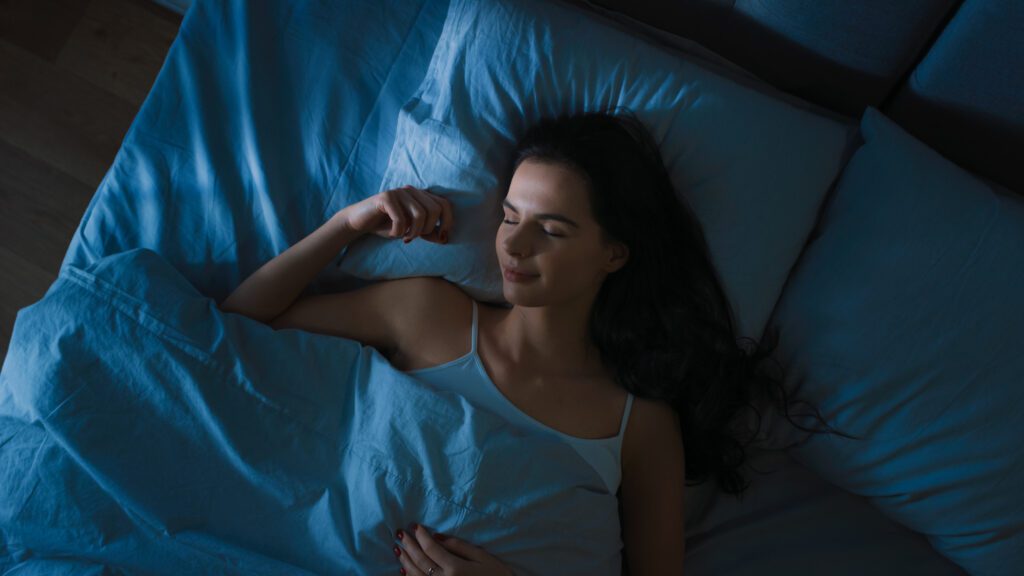Sleep Hygiene refers to the collection of behaviors and environmental factors that can affect the quality and duration of one’s sleep. Good sleep hygiene can be a key to feeling rested and maintaining overall health. It encompasses a variety of practices, such as establishing a consistent sleep schedule, optimizing the bedroom environment, and building pre-sleep routines that signal the body it’s time to wind down. These habits can profoundly impact an individual’s ability to fall asleep and stay asleep, aiding in better cognitive function, emotional regulation, and physical health.
Sleep hygiene is gaining recognition as more people experience sleep disturbances due to modern lifestyles. Factors such as screen time before bed, irregular sleep schedules, and a poor sleep environment can disrupt sleep patterns. Addressing these issues through a structured approach to sleep hygiene can lead to more restful nights and energized days. While individual needs may differ, there are general guidelines that can help most people improve their sleep hygiene and, consequently, their sleep quality.
Key Takeaways
- Establishing a consistent sleeping pattern can aid in better quality rest.
- A conducive sleep environment and pre-sleep routine are crucial for optimal sleep hygiene.
- Improved sleep hygiene contributes to enhanced functioning during waking hours.
Understanding Sleep Hygiene
Sleep hygiene encompasses a set of good sleep habits that foster better sleep quality. It involves both environmental adjustments and behavior practices aimed at enhancing sleep effectiveness.
- Consistent Schedule: Adhering to a regular sleep-wake cycle strengthens the body’s internal clock and helps ensure more restorative sleep.
- Sleep Environment: Optimizing the bedroom environment includes temperature, noise, light, and comfort.
- Pre-sleep Routine: A relaxing routine before bed can signal the body that it’s time to wind down.
A cornerstone of healthy sleep practices is reducing variations in sleep timing. Those who maintain a consistent sleep schedule are likelier to experience quality sleep. It’s recommended that you go to bed and rise at the same times daily, including weekends.
Creating a conducive environment is crucial. This involves minimizing light and noise, regulating room temperature, and ensuring a comfortable mattress and pillows.
Additionally, they should establish a bedtime routine, like reading or taking a warm bath, which can serve as a cue to the body that it’s time to rest.
Embracing healthy habits throughout the day also plays a role. These can include regular physical activity and avoiding stimulants like caffeine close to bedtime. Sleep is a critical component of achieving restful sleep, which is integral for overall health and well-being.
The Role of Routines

Adopting a series of systematic evening habits helps signal the body and mind that it’s time for rest. Consistency in these routines is paramount to cultivating conditions conducive to sleep.
Establishing a Bedtime Routine
A bedtime routine involves performing the same activities in the same order each night before sleep. This consistent routine aids individuals in becoming mentally and physically prepared for bed. Essential elements include setting a fixed bedtime, reading, or practicing relaxation techniques such as prayer, meditation, or progressive muscle relaxation.
Daily Exercise and Sleep
Daily exercise can significantly improve the ease of falling asleep and the quality of sleep itself. However, avoiding being physically active too close to bedtime is suggested. Exercising earlier in the day can help one fall asleep more easily at night.
Eating Habits and Sleep
Dietary habits play a significant role in sleep hygiene. It’s advised to avoid large meals before bedtime, particularly those rich in sugary, fatty, or spicy foods that might cause discomfort. Monitoring and moderating caffeine intake and alcohol consumption throughout the day—especially in the hours leading up to sleep—is beneficial.
Winding Down Activities
Activities that promote relaxation are crucial to a sleep-inducing routine. This may include engaging in calming hobbies like reading, taking a warm bath, or writing in a journal. These activities encourage mindfulness and tranquility, preparing the mind and body for a restful night.
Optimizing the Sleep Environment

Creating the ideal sleep environment is central to sleep hygiene principles. The bedroom should be a sleep sanctuary, where every element is tailored to support uninterrupted rest.
Bedroom Atmosphere
The bedroom environment plays a crucial role in sleep quality. It should be dark, quiet, and comfortable—usually slightly cool around 65°F (18°C). Utilizing blackout curtains can significantly reduce light exposure, while earplugs or a white noise machine may be beneficial for those sensitive to noise.
Mattress and Bedding Choices
One’s mattress and bedding significantly influence comfort and sleep quality. A comfortable mattress and supportive pillows tailored to personal preference contribute to a good night’s rest. The linens, such as blankets and sheets, should be breathable and appropriate for the bedroom temperature, helping maintain a comfortable body temperature throughout the night. Checkout our Mattresses page for more information Mattresses – Sleep Health Network.
Controlling Light and Noise
Managing light exposure is critical; this includes minimizing natural light in the early morning and reducing blue light from screens before bedtime. Consider using an eye mask for added darkness. For sound control, options like a fan for consistent, soothing background noise or a white noise machine can mask disruptive external sounds.
Electronics and Sleep Disturbance
Electronic devices in the bedroom, including TVs, computers, and smartphones, should be minimized to reduce light exposure and the temptation to engage with media. Establishing a boundary that keeps screens out of the sleep-affecting hour before bed is best to prevent disruption from blue light and stimulating content.
Regulating Sleep Patterns
Achieving restorative rest requires consistency and understanding in managing sleep patterns. The following insights address maintaining a regular sleep schedule, confronting sleep disorders, and the interplay between sleep and mental health.
Sleep Schedule Consistency
A consistent sleep schedule enhances circadian rhythm efficiency, reinforcing the natural sleep-wake cycle. Adults are generally recommended to aim for seven to nine hours of quality sleep each night, with a fixed wake-up time and bedtime. Deviations such as frequent napping during the day can disrupt nighttime sleep patterns and should be minimized or avoided.
Strategies for reinforcing a sleep routine include limiting exposure to blue light before sleep and engaging in relaxing activities as part of a pre-bedtime ritual. For example, using electronic devices before bedtime can interfere with the ability to fall asleep. Discontinuing use of electronic devices at least 30 minutes prior to bed is recommended.
Dealing with Sleep Disorders
Sleep disorders like insomnia, sleep apnea, and snoring disrupt the architecture of sleep, leading to daytime fatigue and other health issues. Treatments can range from lifestyle changes to medical interventions, including sleeping pills or therapies such as CPAP for sleep apnea. Anyone experiencing sleep disorder symptoms should consult a healthcare provider for accurate diagnosis and appropriate treatment. Please visit our Sleep Disorders – Sleep Health Network page for more information.
Understanding individual sleep concerns is vital, as highlighted by resources from the CDC, which can offer tailored advice on improving sleep health.
Sleep and Mental Health
The bidirectional relationship between sleep and mental health is significant. Poor sleep can be both a symptom and a cause of conditions like anxiety and stress, leading to a cycle of sleep disruption. Conversely, good sleep can bolster psychological resilience and may alleviate the symptoms of mental health issues.
Maintaining a restful environment and addressing any disturbances can help manage sleep disturbances related to mental health. Early morning sunlight, for example, can regulate one’s internal clock and improve mood.
Lifestyle Factors Affecting Sleep
Several lifestyle factors, including substance use, nap patterns, and sexual activity, can profoundly influence sleep quality. Understanding how these elements interact with sleep can help individuals establish better sleep hygiene.
Impact of Substances
Substance intake, particularly caffeine, alcohol, and nicotine, can significantly disrupt sleep. Caffeine, a stimulant found in coffee, tea, and some soft drinks, should be avoided typically 4-6 hours before bedtime as it can hinder the ability to fall asleep. Alcohol, while it may initially act as a sedative, can lead to non-restful sleep and frequent awakenings later in the night. Nicotine from smoking or smoke exposure has a similar effect to caffeine by stimulating the body and can reduce both the quantity and quality of sleep.
Effects of Daytime Naps
Although sometimes refreshing, daytime naps can negatively affect nighttime sleep if not managed properly. Napping, especially in the late afternoon or for periods longer than 20–30 minutes, can lead to daytime sleepiness and challenges with nighttime sleep. Establishing a routine that tolerates short, early afternoon naps may alleviate these issues without disturbing the night’s rest.
Sleep and Sexual Activity
Maintaining the bedroom environment for sleep and sex only is a vital part of sleep hygiene strategies. Activities outside these two can condition the brain to associate the bed with wakefulness and may lead to difficulty falling asleep. Sexual activity, in contrast, can serve as a natural form of relaxation and may promote a quicker onset of sleep. Maintaining this designated space and bedtime association can help create a mental environment conducive to sleep.
The Impact of Sleep on Health

Sleep plays a vital role in an individual’s physical and mental well-being. Consistent, quality sleep is associated with a range of health benefits, whereas sleep deprivation can lead to serious long-term health issues.
Physical Health Risks
Chronic lack of sleep is linked to numerous physical health problems:
- Heart Disease: It can elevate the risk of cardiovascular issues.
- High Blood Pressure: Sleep helps regulate stress hormones and keep the nervous system healthy.
- Obesity: Poor sleep patterns can disrupt appetite regulation and lead to weight gain.
- Diabetes: Sleep affects blood sugar levels and insulin sensitivity.
- Stroke: A higher incidence rate has been observed with insufficient sleep.
Mental Health Considerations
Sleep quality also influences mental health, with inadequate sleep potentially exacerbating conditions such as anxiety and depression. It plays a crucial role in:
- Cognitive functioning
- Emotional stability
- Psycho-social well-being
Immune Function
The immune system relies on sleep to fight off infections effectively. The body repairs itself during sleep, and lack of sleep can weaken immune defenses.
Regular, restorative sleep is a cornerstone of good health, with research indicating that it is as important as diet and exercise. Notably, the CDC and American Academy of Sleep Medicine confirm that adherence to proper sleep hygiene practices can prevent or mitigate the adverse effects of sleep deprivation.
Strategies for Improved Sleep
Incorporating relaxation techniques into the nightly routine can significantly enhance one’s ability to fall asleep more easily. Techniques such as meditation and mindfulness encourage mental relaxation and can be practiced with the goal of achieving seven hours of sleep, which is recommended by the Centers for Disease Control and Prevention (CDC). Another effective method is progressive muscle relaxation, which involves tensing and relaxing different muscle groups to release physical tension.
Behavioral and Environmental Adjustments
Consistent sleep routines and good sleep habits are fundamental for those looking to improve sleep. Individuals should strive for a regular exercise routine and exposure to natural light during the day. The bedroom environment plays a crucial role, too—optimizing it for comfort and quiet can help one fall asleep more quickly and maintain uninterrupted sleep. To promote consistency, it is also essential to have a fixed wake-up time, even on weekends.
Professional Advice and Resources
When self-help strategies are not enough, seeking treatment from a healthcare provider may be necessary. They can offer personalized advice and access to resources that address specific sleep concerns.
Maintaining a Sleep Diary
A sleep diary is a valuable tool for tracking sleep patterns and habits. By documenting bedtime, wake-up time, and sleep quality, one can gain insights into what practices are beneficial or detrimental to their sleep quality. This diary can then be shared with a healthcare provider to inform potential treatment options.
Conclusion
Effective sleep hygiene practices are pivotal in enhancing sleep quality and duration. They assert consistency in sleep patterns and create an environment conducive to rest. Key points include:
- Establish a Regular Sleep Schedule: Adherence to a consistent sleep-wake cycle seven days a week helps maintain the body’s internal clock.
- Create a Restful Environment: A calm, dark, quiet room facilitates a sleep-ready atmosphere.
- Develop a Bedtime Routine: Engaging in relaxing activities before bed, such as reading or taking a bath, signals the body that it’s time to wind down.
Individuals should restrict stimulants like caffeine and avoid heavy meals close to bedtime, as these can disrupt sleep. Regular physical activity contributes positively to sleep quality, yet it should be avoided right before sleeping.
Sleep hygiene is not a one-size-fits-all approach; personal adjustments are often needed to find an effective approach. Those consistently struggling with sleep may find it beneficial to contact healthcare professionals for individualized advice. Integrating healthy sleep habits can significantly improve one’s well-being.
In summary, they must prioritize creating a supportive environment and engaging in behaviors that favor restorative sleep. Small, thoughtful changes in daily routines can lead to profound improvements in sleep and, by extension, overall health.
Frequently Asked Questions
In this section, various strategies and habits are discussed to answer common queries about sleep hygiene and enhance sleep quality.
What strategies can help improve sleep quality for a more restful night?
They can adopt several strategies to improve sleep quality, such as maintaining a consistent sleep schedule and creating a bedtime ritual that signals the body to wind down. Avoiding caffeine and electronics before bedtime can also be beneficial.
Why is it essential to establish a consistent bedtime routine?
A consistent bedtime routine helps to regulate the body’s clock and can lead to better sleep over time. This consistency signals the body when to wind down and prepares the mind for sleep.
What are the recommended environmental conditions for optimal sleep?
The optimal sleep environment is cool, dark, and quiet. Experts suggest regulating the temperature, using blackout curtains or an eye mask, and considering white noise machines to block out disruptions.
How do dietary and lifestyle choices affect sleep hygiene?
Dietary choices such as reducing caffeine and nicotine can lead to better sleep, as these substances can cause sleep disturbances. Regular physical activity is also beneficial but should be avoided close to bedtime.
What are common misconceptions about sleep-promoting practices?
One common misconception is that alcohol can aid sleep. While it may help initiate sleep, it disrupts sleep later. Another is the idea that sleeping on weekends can compensate for lost sleep, but this can disrupt the regular sleep-wake cycle.
How can one modify their sleep environment to enhance sleep quality?
Modifications can include investing in a comfortable mattress and pillows, reducing noise and light, and keeping electronic devices away from the bed. Maintaining a cool temperature can also significantly improve sleep quality.




2 comments
[…] sleep quality and reduce the likelihood of sleep disturbances in the aging population. See our post Sleep Hygiene: Essential Strategies for Better Sleep Quality – Sleep Health Network to learn more about sleep hygiene best […]
[…] technology use, especially before bed, can disrupt sleep hygiene. Screens emit blue light, which can suppress the production of melatonin, a hormone that regulates […]